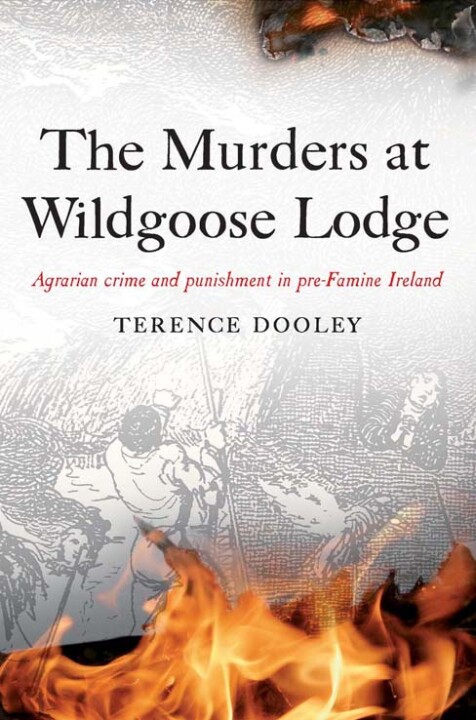The murders at Wildgoose Lodge
Agrarian crime and punishment in pre-Famine Ireland
Terence Dooley
Voted as one of the two most intriguing studies in Irish history by Paul Bew in the Irish Times Books of the Year 2007 supplement.
'Terence Dooley recreates what happened on the night and the aftermath in an intriguing story of a local incident that had national implications', Ireland's Own.
'One night in late October 1816 a house known as Wildgoose Lodge, in a remote part of County Louth, was deliberately set on fire and its inhabitants prevented from escaping by a large number of men gathered outside. As a result, eight people were burnt to death. The victims were an elderly Catholic strong farmer, Edward Lynch, his son, daughter, son-in-law, baby grandson and three young servants. During the following year, twenty-six men were arrested in connection with the crime, eighteen of whom were executed in 1818. The bodies of the hanged men were either gibbeted in different parts of Louth or given to surgeons for dissection, thus denying them burial … Terence Dooley – an NUI Maynooth historian with an interest in landed estates, who grew up in south County Monaghan, and who heard local tales about the murderers during his childhood – provides a detailed and wide-ranging scholarly analysis of this gruesome event … One of the strengths of this book, like Bourke’s work on the Cleary murder, is its ability to combine detailed local knowledge with an awareness of much broader political, economic and social developments … This is a fine book, demonstrating the value of case studies to the growing historiography of crime and violence in eighteenth and nineteenth-century Ireland. It is a scholarly piece of work, yet, like a good fictional murder mystery, is written in an engaging manner, which certainly kept this reader eagerly turning the pages', Elizabeth Malcolm, School of Historical Studies, Irish Historical Studies (May 2009).
'This book explores a brutal murder that involved the burning to death of the six inhabitants of a farmhouse known as Wildgoose Lodge on the Louth/Monaghan border in late 1816 .... [it] is a fascinating piece of historical detective work. It not only involves a compelling narrative of crime and punishment, but it examines the complex social and judicial workings of provincial Ireland before the advent of the reforming state of the 1830s .... Dooley’s analysis of the background, context and outcome of the Wildgoose Lodge incident throws light on the many complex social, economic and political networks in pre-Famine Ireland .... The strengths of this work are two-fold. Firstly, it is based on untiring research and attention to detail. It shows how the tenacious tracing of one local incident through multiple sources can answer and raise questions regarding many aspects of Irish pre-Famine society. Secondly, it is based on an intimate knowledge of, and affection for, the region in question. This familiarity with terrain, landscape and local memory (even if this memory is skewed) gives a depth of understanding that—balanced by rigorous historical scholarship—can seldom be matched by the outsider view. It is a publication well worth reading and re-reading', Maura Cronin, Irish Economic and Social History (Winter 2008).
'Dooley’s treatment of the subject makes for a riveting good read … Dooley places a great deal of emphasis on combining a well defined narrative with erudite interpretation … What emerges is not alone a reflective critique of extant sources, but a remarkable interweave of evidence and objective interpretation, which ultimately produces a nuanced illumination of the subject.' Ned McHugh, Co. Louth Archaeological and Historical Journal (2007).

